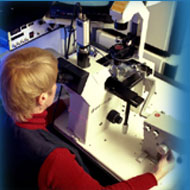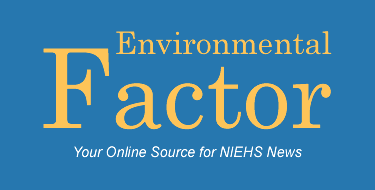
Environmental Factor, May 2008, National Institute of Environmental Health Sciences
Science Teachers Attend NIEHS Workshop on Toxicology
By Eddy Ball
May 2008
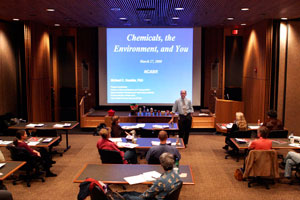
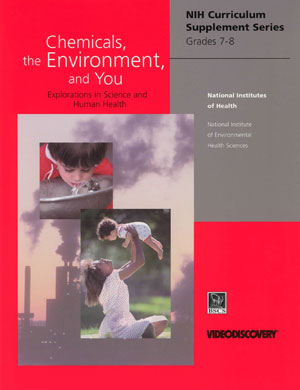
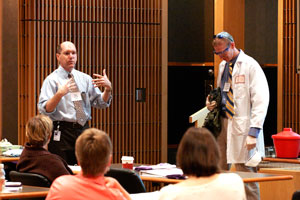
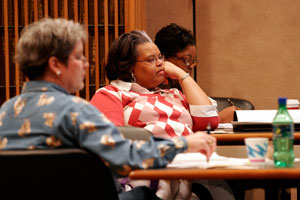
NIEHS held its second 2008 continuing education “Rx for Science Literacy” workshop for science teachers in Rodbell Auditorium March 27. The attendees experienced a full day of participant-involvement exercises, presentations and facility tours introducing them to new developments in the field and giving them credit for re-certification. The workshops, which have trained science educators for almost a decade, offer NIEHS scientists, who generously volunteer their time, an opportunity to move research findings from the laboratory to the middle- and high-school classroom.
The workshop, titled “Chemicals, the Environment and You,” was jointly sponsored by the North Carolina Association for Biomedical Research (NCABR)(http://www.ncabr.org/) ![]() and NIEHS under the direction of Marian Johnson-Thompson, Ph.D., NIEHS director of Biomedical Research and Education. In Johnson’s absence, NIEHS Industrial Hygienist Sharon Beard and NIEHS Health Science Administrator Joan Packenham, Ph.D., facilitated the program. They were joined by NCBAR Communications Director Derek Howles in welcoming the participants to the event.
and NIEHS under the direction of Marian Johnson-Thompson, Ph.D., NIEHS director of Biomedical Research and Education. In Johnson’s absence, NIEHS Industrial Hygienist Sharon Beard and NIEHS Health Science Administrator Joan Packenham, Ph.D., facilitated the program. They were joined by NCBAR Communications Director Derek Howles in welcoming the participants to the event.
Most of the teachers work in schools in North Carolina’s Piedmont region, but participants came from as far away as Marshall in the Western North Carolina Mountains and Manteo in the far eastern part of the state.
Although many volunteers from NIEHS contributed to the success of the event, the featured presenter for the toxicology workshop was NIEHS Health Science Administrator Mike Humble, Ph.D., whose background includes six years’ experience as a high-school science teacher. Humble took the participants through sample exercises of an NIH/NIEHS Curriculum Supplement Series(http://science-education.nih.gov/supplements) ![]() , Explorations in Science and Human Health, and introduced the teachers to the interactive DVD of exercises and resources they can use to support the eleven-unit curriculum in their classrooms.
, Explorations in Science and Human Health, and introduced the teachers to the interactive DVD of exercises and resources they can use to support the eleven-unit curriculum in their classrooms.
Throughout the morning session, Humble challenged the teachers “to think like an eighth grader” as a way to bridge the gap between the world of science and the experiences of young people. He kept the teachers engaged by combining humor, hands-on exercises and practical applications to students’ real world experiences. In the afternoon, participants also heard a talk on Toxicogenomics by NIEHS Senior Scientist Rick Paules, Ph.D.
A previous workshop in the “Rx for Science Literacy” series held March 6 was organized around the theme of “Human Genetic Variation” and also featured a curriculum overview by Humble. In addition, that program included presentations by NIEHS volunteers Liam O’Fallon, a program analyst in the Division of Extramural Research and Training, and Program Analysis Branch Chief and Training Senior Investigator Ben Van Houten, Ph.D.
As part of both workshops, the teachers toured the NIEHS animal facility and heard a presentation on “Humane Use of Animals in Environmental Health Research.” by Comparative Medicine Branch Chief Diane Forsythe, D.V.M., and Deputy Chief Mary Grant, V.M.D. Participants also toured the NIEHS Microarray Lab, and watched demonstrations by Technical Laboratory Manager Kevin Gerrish, Ph.D., and Biologist Jennifer Collins.
Founded in 1989, NCBAR is a statewide nonprofit organization with members representing academia, industry, government, hospitals, nonprofit research groups, voluntary health and other nonprofit organizations, as well as the general public. Through its partnerships, the organization has involved nearly 3,000 state residents in science education programs, public forums to debate biomedical research issues and an NCABR science journalism program.
"NIH Holds First..." - previous story ![]()
![]() next story - "Former Postdoc Awarded..."
next story - "Former Postdoc Awarded..."
May 2008 Cover Page
